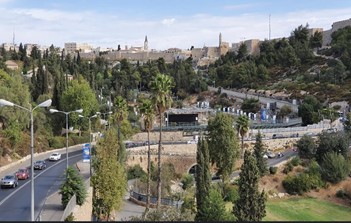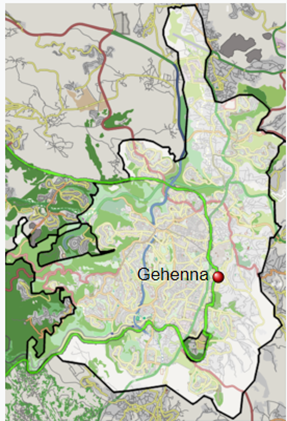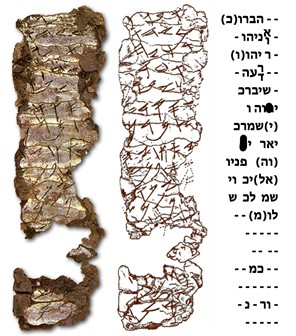Tzav
At God’s command, Jeremiah stands at the Temple gate, delivering blistering, confrontational messages to its visitors about every sector of Judean society. His fiery, mocking speeches, found in chapters 7-10 of his book, include rebukes, calls to repentance, promises of God’s reward and punishment, and more. Jeremiah reminds the people that God destroyed Shilo, the Tabernacle’s home for centuries, due to their sins. Lamenting Judah’s coming destruction, he recounts its spiritual failures, including widespread idolatry and false trust in the Temple’s invincibility. He also attacks its moral and societal injustices, including child sacrifice, murder, adultery, oppressing society’s vulnerable, lying, and corrupt leadership.
The Haftarah states that the Sinaitic covenant requires God’s people to obey all His commands. Since then, Jeremiah declares, the generations have declined. They also rejected generations of prophets God sent to improve them. Yet despite their depravities, the people still sacrifice to God at the Temple, seemingly following the laws of Parashiot Vayikra and Tzav. Jeremiah blasts these offerings as worthless without observance of the entire covenant.
Judeans worshipped idols throughout Judah and in the Temple, even practicing child sacrifice in the nearby Ben Hinnom Valley. God will punish the people and turn these idolatrous sites into fields of slaughter and overflowing mass graves. Later, the bones of Judah’s idolatrous leadership and Jerusalem’s residents will be exhumed, eventually to rot. As is customary, the Haftarah concludes on a positive note , stating that the true service and knowledge of God consists of pursuing kindness, righteousness and justice.
Haftarah Breakdown
Verses 7:21-22: The people think that sacrifices at the Temple, on their own, protect them. Jeremiah declares that such sacrifices are worthless, exaggeratingly stating that God never commanded them at all.
Jeremiah 7:22
For I [God] did not speak to your fathers, nor command them on the day I brought them out of the land of Egypt, regarding matters of a burnt offering or a sacrifice [that is eaten].
כִּי לֹא־דִבַּרְתִּי אֶת־אֲבוֹתֵיכֶם וְלֹא צִוִּיתִים בְּיוֹם (הוציא) [הוֹצִיאִי] אוֹתָם מֵאֶרֶץ מִצְרָיִם עַל־דִּבְרֵי עוֹלָה וָזָבַח
Verse 7:23: Overall obedience to God is the foundation of the Sinai covenant, and what God truly commanded.
Jeremiah 7:23
But this thing I commanded them, saying, “Obey My voice, and I will be your God, and you shall be My people: walk in all the ways that I have commanded you, that it may be well with you.”
כִּ֣י אִֽם־אֶת־הַדָּבָ֣ר הַ֠זֶּ֠ה צִוִּ֨יתִי אוֹתָ֤ם לֵאמֹר֙ שִׁמְע֣וּ בְקוֹלִ֔י וְהָיִ֤יתִי לָכֶם֙ לֵֽאלֹקים וְאַתֶּ֖ם תִּֽהְיוּ־לִ֣י לְעָ֑ם וַהֲלַכְתֶּ֗ם בְּכׇל־הַדֶּ֙רֶךְ֙ אֲשֶׁ֣ר אֲצַוֶּ֣ה אֶתְכֶ֔ם לְמַ֖עַן יִיטַ֥ב לָכֶֽם׃
Verses 7:24-28: Since the Exodus, the people have not obeyed God’s word, with each generation being worse than its predecessor. For generations, they have rejected God’s constant stream of prophets, and will reject Jeremiah, too.
Jeremiah 7:24
They did not hearken, nor incline their ear. They walked in the counsels [and] imaginations of their evil heart, and went backward, and not forward.
וְלֹ֤א שָֽׁמְעוּ֙ וְלֹא־הִטּ֣וּ אֶת־אׇזְנָ֔ם וַיֵּֽלְכוּ֙ בְּמֹ֣עֵצ֔וֹת בִּשְׁרִר֖וּת לִבָּ֣ם הָרָ֑ע וַיִּהְי֥וּ לְאָח֖וֹר וְלֹ֥א לְפָנִֽים׃
Verses 7:29-31: Due to God’s rejection of His people, Jeremiah calls for lamentation upon the hills where Judah worshipped idols. The people also erected idols in the Temple and sacrificed children in the Ben Hinnom Valley.
Jeremiah 7:31
They have built high places of Tofet that are in the Valley of Ben-hinnom, to burn their sons and their daughters in fire, which I did not command, nor did it arise in My heart.
וּבָנ֞וּ בָּמ֣וֹת הַתֹּ֗פֶת אֲשֶׁר֙ בְּגֵ֣יא בֶן־הִנֹּ֔ם לִשְׂרֹ֛ף אֶת־בְּנֵיהֶ֥ם וְאֶת־בְּנֹתֵיהֶ֖ם בָּאֵ֑שׁ אֲשֶׁר֙ לֹ֣א צִוִּ֔יתִי וְלֹ֥א עָלְתָ֖ה עַל־לִבִּֽי׃ {פ}
Verses 7:32-34: Ben Hinnom Valley will become known as a mass grave for God’s mass slaughter of idolatrous Judeans. After the graves are filled, birds of prey will consume the corpses. Joy will cease in Judah.
Jeremiah 7:32
“Therefore, behold, days are coming,” says the Lord. “It shall no longer be called Tofet or the Valley of Ben-hinnom, but rather the Valley of Slaughter. They shall bury [even] in Tofet for there is no [other] place.” לָכֵ֞ן הִנֵּֽה־יָמִ֤ים בָּאִים֙ נְאֻם־ה' וְלֹא־יֵאָמֵ֨ר ע֤וֹד הַתֹּ֙פֶת֙ וְגֵ֣יא בֶן־הִנֹּ֔ם כִּ֖י אִם־גֵּ֣יא הַהֲרֵגָ֑ה וְקָבְר֥וּ בְתֹ֖פֶת מֵאֵ֥ין מָקֽוֹם׃
Verses 8:1-3: Further, invaders will exhume the bones of Judah’s idolatrous leaders and Jerusalem’s residents, and leave them unburied until they rot. The fate of the few survivors will be even worse than the dead.
Jeremiah 8:2
They shall spread [the bones] before the sun, the moon, and the entire heavenly host that they have loved, that they have served, after whom they have walked, that they have sought, and that they have prostrated to. [The bones] shall not be gathered, nor be buried. They shall be for dung upon the face of the earth.
וּשְׁטָחוּם֩ לַשֶּׁ֨מֶשׁ וְלַיָּרֵ֜חַ וּלְכֹ֣ל ׀ צְבָ֣א הַשָּׁמַ֗יִם אֲשֶׁ֨ר אֲהֵב֜וּם וַאֲשֶׁ֤ר עֲבָדוּם֙ וַֽאֲשֶׁר֙ הָלְכ֣וּ אַחֲרֵיהֶ֔ם וַאֲשֶׁ֣ר דְּרָשׁ֔וּם וַאֲשֶׁ֥ר הִֽשְׁתַּחֲו֖וּ לָהֶ֑ם לֹ֤א יֵאָֽסְפוּ֙ וְלֹ֣א יִקָּבֵ֔רוּ לְדֹ֛מֶן עַל־פְּנֵ֥י הָאֲדָמָ֖ה יִהְיֽוּ׃
Verses 9:22-23: Aside from knowing God and acting accordingly, nothing else is worthwhile.
Jeremiah 9:23
“But let the one who glories, glory in this- that he understands and knows Me, for I am the Lord Who practices kindness, justice and righteousness on the earth, for in these do I delight”, declares the Lord.
כִּ֣י אִם־בְּזֹ֞את יִתְהַלֵּ֣ל הַמִּתְהַלֵּ֗ל הַשְׂכֵּל֮ וְיָדֹ֣עַ אוֹתִי֒ כִּ֚י אֲנִ֣י ה' עֹ֥שֶׂה חֶ֛סֶד מִשְׁפָּ֥ט וּצְדָקָ֖ה בָּאָ֑רֶץ כִּֽי־בְאֵ֥לֶּה חָפַ֖צְתִּי נְאֻם־ה'
Connection
The Talmud relates Jeremiah’s criticism of child sacrifice (7:31, above) to other instances of actual (or near) human sacrifice in the Bible.
Taanit 4a
“Which I [God] did not command” [refers to] the son of Mesha, king of Moab, as (II Kings 3:27) states: “[King Mesha] took his firstborn son, who would reign after him, and offered him as a burnt-offering.”...
“Nor did it arise in My heart,” refers to Isaac, son of Abraham.
״אֲשֶׁר לֹא צִוֵּיתִי״ — זֶה בְּנוֹ שֶׁל מֵישַׁע מֶלֶךְ מוֹאָב, שֶׁנֶּאֱמַר: ״וַיִּקַּח אֶת בְּנוֹ הַבְּכוֹר אֲשֶׁר יִמְלֹךְ תַּחְתָּיו וַיַּעֲלֵהוּ עֹלָה״…
״וְלֹא עָלְתָה עַל לִבִּי״ — זֶה יִצְחָק בֶּן אַבְרָהָם.
Haftarah Geography & Archeology

The photograph shows its recent appearance. Located in and around the valley is a public park and the Menachem Begin Heritage Center.
In 1975, Gabriel Barkay discovered the Ketef Hinnom burial caves, shown below, from the First Temple period, under St. Andrews Church. The Talmud (Sanhedrin 96b) connects burial caves in the area to their inhabitant’s ultimate fate, described in verses 8:1-3.
The caves contained the oldest Biblical text ever discovered, a pair of silver scrolls containing the text of the Priestly Blessing (Num. 6:24-26); see images below right.

With emendations, all translations are from Sefaria.org. All images from Wikimedia. To dedicate, comment, or subscribe, email haftarahhelper@gmail.com.


